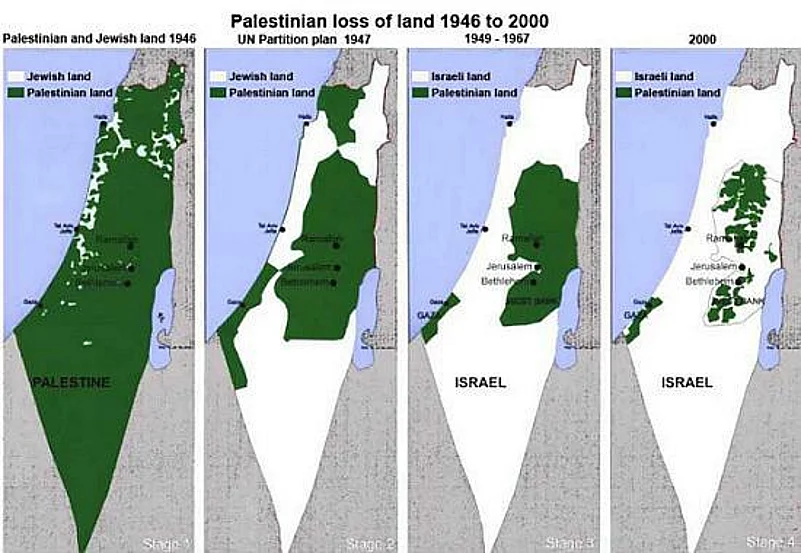In the USA, the ‘Palestine-Israel conflict’ is principally told as a single story thread of a beleaguered Jewish state amidst irrational enemies. Palestinians are too often depicted as the aggressors or, when mentioning their suffering is unavoidable, they are described in the sterile prose of numbers and statistics. It is stunning how few Americans realize that for the past 60+ years, Israel has been systematically wiping Palestine off the map:

But perhaps that is changing.
I recently returned from PalFest, the Palestinian Literature Festival, where I had the privilege of seeing my country through the eyes of notable individuals who had never been there before. PalFest was to take place in the West Bank, an area significantly smaller than Connecticut; however, because Palestinians are not free to move about from one West Bank town to another, a centralized festival is untenable. So, PalFest travels to the audiences in each town instead.
For seven days and six nights, I was off an on a tour bus throughout Occupied Palestine with some 30 other writers, artists, filmmakers, and actors from the US, UK, Sweden, South Africa, Norway, Italy, and Spain. Although these were all well-read sophisticates, it seems none was prepared for the reality on the ground. Without exception, each participant was shocked by the system of apartheid that he or she witnessed. To see oppression up close is different from reading about it.
On our last bus ride, one PalFest participant asked me, “What was the moment for you?”
Advertisement
The first thing to mind was the most recent: a conference with Gazan teachers and students from three universities. It was a video-conference because we were denied entry into Gaza and Gazans surely are not allowed to leave their tiny sliver of land. They spoke to us about the inhuman siege since 2006, the barbaric month-long bombardment that one Israeli soldier described as putting “a magnifying glass looking at ants, burning them,” their polluted water, deteriorating general health, the unravelling of families, the tunnels that have been Gaza’s only lifeline for food and now the Egyptian underground wall that will seal off these tunnels. One young woman said she could live with the shortage of food, water and medicine, “but the intellectual siege” is intolerable, she said. For years, she hasn’t been able to get books to read, save what few can be smuggled in from tunnels.
Yet this was not the worse of what we heard or saw. There was the ghost town of Hebron, emptied of its native inhabitants, who have been terrorized by settlers into fleeing. The bypass, Jewish-only roads; the Jewish-only settlements on confiscated Palestinian property; the wall and system of checkpoints that surround, separate, and suffocate Palestinian towns; the tents housing families near the rubble remains of their demolished homes in Jerusalem; and the armed settlers and soldiers.
What seemed to surprise most, however, was that Palestinian society still teems with will and life and resolve and intellectual curiosity – that despite all the odds, they are not a broken people.
If I had to identify the moment now, it would be a comment made by my friend Dr. Rev. Mitri Raheb who took us on a tour of the place now best described as “The Little Ghetto of Bethlehem”. He articulated something I already knew but have never quite put into words. “They didn’t just steal our country, our homes and properties. They stole our story. We are the people of the Bible. The Bible is our story, but they have taken even that,” he said.
I have always understood that we are the descendants of the original inhabitants (including the Hebrew tribes) who converted between religions. But I’m not religious and our story springs from the native human narratives of the land. And now, as the first and second generations in the Diaspora can communicate in the languages of the West, our voice can be understood in ways it was not previously.
The world is at last listening, reading, watching, and sometimes taking action as we struggle to reclaim the things stolen from us. Through our own literature, art, poetry, activism, music, film, photography, and culture; through our humanity, we are reclaiming our home, our heritage, basic human rights, our dignity, and our story.
Advertisement
Susan Abulhawa is the author of Mornings in Jenin (Bloomsbury 2010) and founder of Playgrounds for Palestine



















